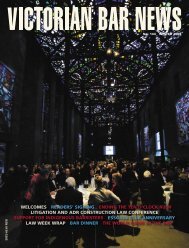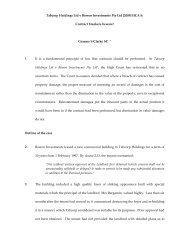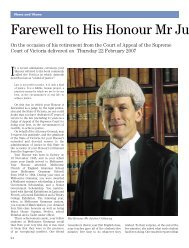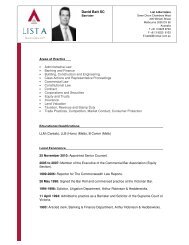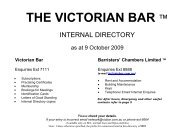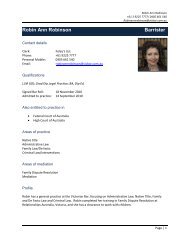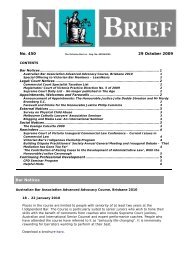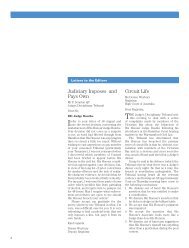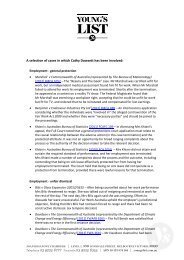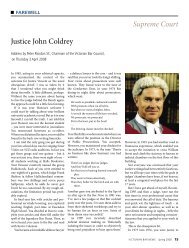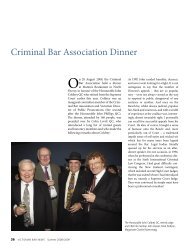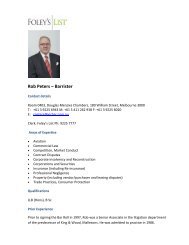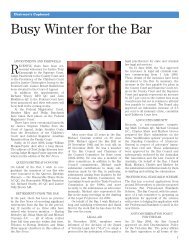Justice William Charles Crockett AO - Victorian Bar
Justice William Charles Crockett AO - Victorian Bar
Justice William Charles Crockett AO - Victorian Bar
- No tags were found...
You also want an ePaper? Increase the reach of your titles
YUMPU automatically turns print PDFs into web optimized ePapers that Google loves.
News and ViewsJewish ObservanceThe East MelbourneHebrew CongregationAddress by Rabbi Shamir CaplanESTEEMED Judges, barristers, membersof the legal profession, representingthe State Government MrTony Lupton, representing the OppositionMr David Davis, Rabbi Heilbron, synagoguePresident Danny Segal, welcometo everyone present today. Thank you forcoming this morning to East MelbourneHebrew Congregation. On behalf of theboard, I would especially like to thankKliger Partners and Madgwicks for theirgenerous sponsorship of the morning teain our social hall, to which everyone isinvited following the service.Moments ago, we read together from apassage in Deuteronomy, in which Mosesreminds the Jewish People that they areto utilize judges — to establish a courtsystem — who are to decide justly inthe popular disputes presented to them.The book of Deuteronomy itself is in factlargely Moses’ recapitulation of the eventsand teachings contained in the past fourbooks of the Torah.And it so happens that the establishmentof this system of judges that Mosesis referring to in Deuteronomy is firstmentioned in Exodus; indeed, the publicTorah reading two weeks from now willinclude these very verses.And when you read that section ofExodus, you realize two surprising things.First, the concept of establishing a judicialsystem in the Torah isn’t explicitly attributedto God. It didn’t even come fromMoses, the Giver of the Law. Chapter 18tells us that Yitro/Jethro, Moses’ fatherin-law,who in point of fact was a paganpriest, is the one who conceived of thisinnovation. And Moses, and his people,accepted this suggestion, because, asour sages teach us, we must accept truthwhen we are presented with it, regardlessof its source. And further, by implication,this passage takes for granted that thereis profound truth in the world around56Rabbi Shamir Caplan.us, taught by people other than our coreligionists,that we can and should learnfrom. In countless ways, the Torah expectsof us a deep sensitivity and respect for theOther. Given the news these past fewweeks, I humbly submit that clerics of allstripes would do well to remember thismessage.And so, Jethro tells his son-in-lawMoses, who has just led his people fromtheir terrible slavery in Egypt, you arenot doing the right thing. Your people arecoming to you — the whole nation turnsto you — to resolve their differences, tohelp them understand the practical applicationsof the divine law. And it’s simplytoo much for you. Find worthy judgesfrom among your people, prepare themwell, let them adjudicate. And if there areissues that they cannot resolve, let thembe referred to you, the “ultimate appellatecourt”, for after all you, Moses, are the onewho received the revelation of the divinelaw originally.This sounds like very practicaladvice on effective client management.Wonderful! But ladies and gentleman, wehave a problem. Because this conversationbetween Jethro and Moses takes place afew pages before we read about the revelationitself! Jethro is telling Moses howto efficiently adjudicate the law, beforethe law exists. Moses only receives theTen Commandments, the beginning of therevelation of the Torah, two chapters after



